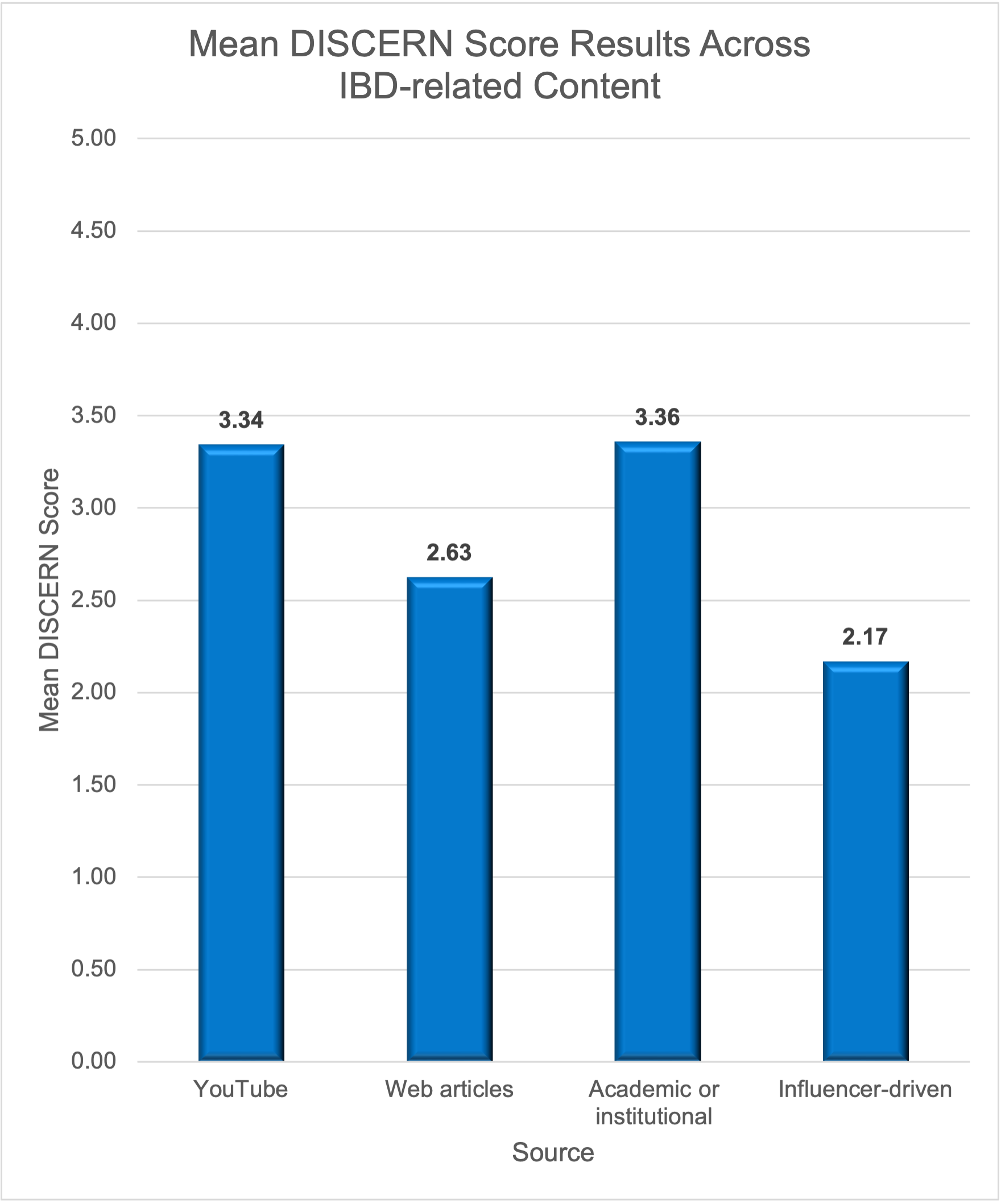Sunday Poster Session
Category: IBD
P1033 - Assessing the Quality of Social Media Content on Inflammatory Bowel Disease Treatment: A Cross-Platform Analysis Using the DISCERN Tool
Sunday, October 26, 2025
3:30 PM - 7:00 PM PDT
Location: Exhibit Hall

Abby Kunitsky, DO
McLaren Macomb
Mt. Clemens, MI
Presenting Author(s)
Abby Kunitsky, DO1, Cole Bernstein, 2, Avi Toiv, MD3, Tobias Zuchelli, 3
1McLaren Macomb, Mt. Clemens, MI; 2Kansas City University, Kansas City, MO; 3Henry Ford Hospital, Detroit, MI
Introduction: Inflammatory bowel disease (IBD), including Crohn’s disease and ulcerative colitis, affects millions worldwide. IBD patients have increasingly turned to social media for education, support, and guidance. While these platforms offer rapid and convenient access to content, the accuracy and quality remain largely unregulated. This study evaluated the quality of the most widely consumed IBD-related social media content. We hypothesized that highly engaged posts would demonstrate significant informational shortcomings that may undermine informed patient decision-making.
Methods: BuzzSumo identified top-performing English articles and videos related to IBD treatments across Facebook, YouTube, Twitter, and Reddit between April 2024 and April 2025. Search terms included “Crohn’s disease treatment,” “ulcerative colitis treatment,” and “inflammatory bowel disease treatment”. Inclusion criteria consisted of a total engagement score of >75 (likes, shares, comments), functional links, and clear relevance to IBD diagnosis or treatment. Each source was independently assessed by three reviewers using the DISCERN tool, rating health content from 1 (serious shortcomings) to 5 (high-quality, evidence-based information with no shortcomings). Analysis of variance (ANOVA) compared mean scores across platforms and content types.
Results: A total of 17 sources (13 articles, 4 videos) met inclusion criteria. Content focused heavily on dietary strategies, biologic therapy, and lifestyle modifications. YouTube videos had the highest engagement scores and second highest mean DISCERN score (3.34), indicating good quality of information. Web articles scored less than YouTube (2.63), and were in the low-quality range, but were one of the most common types of content evaluated. The highest-rated content involved explanations of biologic therapy and diet by academic or institutional sources (3.36), whereas influencer-driven dietary advice scored lowest (2.17). All findings were statistically significant (p-value of < 0.05). Common deficiencies included lack of citation of evidence, minimal discussion of treatment risks, and little emphasis on shared decision-making.
Discussion: Popular social media content on IBD is often low in quality and may mislead patients seeking guidance about their disease. Given the chronic nature and complexity of IBD, there is a critical need for healthcare professionals to continue to create engaging, accurate, and accessible content to support informed patient care in the digital age.

Figure: The mean DISCERN scores across IBD-related content, with the DISCERN tool rating health content from 1 (serious shortcomings) to 5 (high-quality, evidence-based information with no shortcomings).
Disclosures:
Abby Kunitsky indicated no relevant financial relationships.
Cole Bernstein indicated no relevant financial relationships.
Avi Toiv indicated no relevant financial relationships.
Tobias Zuchelli: Boston Scientific – Consultant.
Abby Kunitsky, DO1, Cole Bernstein, 2, Avi Toiv, MD3, Tobias Zuchelli, 3. P1033 - Assessing the Quality of Social Media Content on Inflammatory Bowel Disease Treatment: A Cross-Platform Analysis Using the DISCERN Tool, ACG 2025 Annual Scientific Meeting Abstracts. Phoenix, AZ: American College of Gastroenterology.
1McLaren Macomb, Mt. Clemens, MI; 2Kansas City University, Kansas City, MO; 3Henry Ford Hospital, Detroit, MI
Introduction: Inflammatory bowel disease (IBD), including Crohn’s disease and ulcerative colitis, affects millions worldwide. IBD patients have increasingly turned to social media for education, support, and guidance. While these platforms offer rapid and convenient access to content, the accuracy and quality remain largely unregulated. This study evaluated the quality of the most widely consumed IBD-related social media content. We hypothesized that highly engaged posts would demonstrate significant informational shortcomings that may undermine informed patient decision-making.
Methods: BuzzSumo identified top-performing English articles and videos related to IBD treatments across Facebook, YouTube, Twitter, and Reddit between April 2024 and April 2025. Search terms included “Crohn’s disease treatment,” “ulcerative colitis treatment,” and “inflammatory bowel disease treatment”. Inclusion criteria consisted of a total engagement score of >75 (likes, shares, comments), functional links, and clear relevance to IBD diagnosis or treatment. Each source was independently assessed by three reviewers using the DISCERN tool, rating health content from 1 (serious shortcomings) to 5 (high-quality, evidence-based information with no shortcomings). Analysis of variance (ANOVA) compared mean scores across platforms and content types.
Results: A total of 17 sources (13 articles, 4 videos) met inclusion criteria. Content focused heavily on dietary strategies, biologic therapy, and lifestyle modifications. YouTube videos had the highest engagement scores and second highest mean DISCERN score (3.34), indicating good quality of information. Web articles scored less than YouTube (2.63), and were in the low-quality range, but were one of the most common types of content evaluated. The highest-rated content involved explanations of biologic therapy and diet by academic or institutional sources (3.36), whereas influencer-driven dietary advice scored lowest (2.17). All findings were statistically significant (p-value of < 0.05). Common deficiencies included lack of citation of evidence, minimal discussion of treatment risks, and little emphasis on shared decision-making.
Discussion: Popular social media content on IBD is often low in quality and may mislead patients seeking guidance about their disease. Given the chronic nature and complexity of IBD, there is a critical need for healthcare professionals to continue to create engaging, accurate, and accessible content to support informed patient care in the digital age.

Figure: The mean DISCERN scores across IBD-related content, with the DISCERN tool rating health content from 1 (serious shortcomings) to 5 (high-quality, evidence-based information with no shortcomings).
Disclosures:
Abby Kunitsky indicated no relevant financial relationships.
Cole Bernstein indicated no relevant financial relationships.
Avi Toiv indicated no relevant financial relationships.
Tobias Zuchelli: Boston Scientific – Consultant.
Abby Kunitsky, DO1, Cole Bernstein, 2, Avi Toiv, MD3, Tobias Zuchelli, 3. P1033 - Assessing the Quality of Social Media Content on Inflammatory Bowel Disease Treatment: A Cross-Platform Analysis Using the DISCERN Tool, ACG 2025 Annual Scientific Meeting Abstracts. Phoenix, AZ: American College of Gastroenterology.
